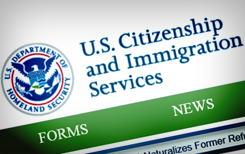In 2009, when the Obama administration arrived, the losses in USCIS fees due to approved fee waivers were at a modest $27 million a year, then it went to $87 million in FY 2011, and currently it is projected to soar to $198 million a year.

The agency is 95 percent funded by fees, paid by aliens and their employers, and the rest by tax funds. The projected loss is thus substantial, and, until now, a total secret. The $198 million is not a published number, it is an estimate based on published non-financial numbers from USCIS and my own detective work, described below.
Losses because of the fee waivers mean higher fees for the aliens who do pay, longer waiting times for everyone working with the agency, and, ultimately, requests for more tax funding to make up for some of the losses.
The loss because of the fee waivers comes at a particularly sensitive time, because as my CIS colleague Jessica Vaughan has reported, the new Deferred Action for Childhood Arrivals (DACA) amnesty offers a free ride to illegals applying for the main benefit, but a $380 fee for the related employment authorization card and an $85 fee for fingerprints. Given the complexity of these cases, it is easy to see that the DACA rates are true bargains.
As I pointed out in an earlier blog entitled "USCIS Offers Two Faces When it Comes to Fee Waivers", the agency (at least at the time of this writing) said not a word in its budget request to Congress about the losses involved in fee waivers, but it spent much energy and many words, in several languages, telling aliens that if they had a good poverty story — as some of them do — they could obtain a waiver of the fees that fund USCIS.
Where did I get the $198 million estimate? Let me first report on the $27 million and the $87 million estimates. The $27 million number was given to me by a USCIS press officer several years ago. The second was estimated, painfully, from some data I pried out of USCIS in connection with one of its stakeholders meetings.
The agency, which frankly is not good with numbers, issued a long list of its various forms for which people (mostly aliens) had asked for fee waivers; it gave the number of the form, and the number of fee waiver approvals for each form. There were no dollar figures so I had look up the fees for each form (waived fees average about $585) and then multiplied the number of forms by the fees for each of some 30 categories, and then totaled the data.
If that were not bad enough, I sensed that the numbers shown by the agency could not be for three months, as stated. I was right. After three weeks of pulling strings and asking questions it turned out that the published data was for seven months, not for three. I then worked through all the categories, and projected seven months into a full year and got $87 million. For more on that process see my blog "Disentangling Fee-Waiver Data from the USCIS Statistical Swamp".
This time around it was a little easier to break the code, but again, no dollar figures were issued by USCIS. Interpreter Releases, the immigration bar's trade paper, noted that USCIS had announced that it was reviewing the text of the I-912, the form that creates fee waivers, and had placed a notice in the Federal Register to that effect. That announcement indicated that USCIS expected 400,000 utilizations of the form, presumably in a year, though the period was not specified.
Since the earlier fee data from USCIS had indicated an approximate 85 percent approval rate for these forms, that would suggest that the agency expected to grant fee waivers in 340,000 cases a year. Given the average size of the fees, which have not been adjusted upwards since 2010, that comes to about $198,000,000.
Again, that is my estimate based on the data shown above; it is not a published USCIS number. Congress should insist that USCIS submit fee waiver data to it at least annually.
As to the text of the application for the fee waiver form, the I-912, my suggestion is that information be demanded of the applicant on such routine variables as address, land line phone, cell phone, e-mail address, and credit card numbers so that USCIS officers can quickly — without looking at other forms — check on data provided by the applicant.
My suspicion is that USCIS does not check these applications very carefully, and is not interested in expanding the techniques available to it to do so.
But if an applicant indicated that he was prosperous enough, for instance, to have obtained a telephone and an e-mail address and a credit card or two, maybe he would not need the waiver. And even USCIS might notice that! Or it might not.
